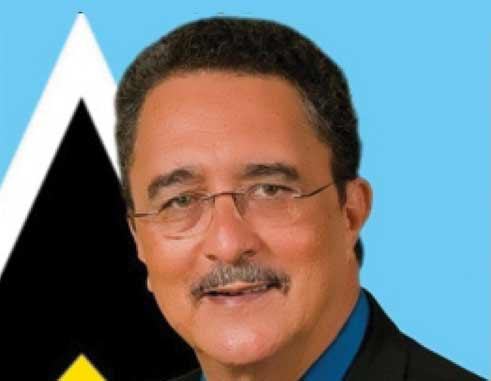“A search for collective determination”.
That was the title that Prime Minister Anthony gave to his New Year’s address to the nation last Monday. It was an address that was in two distinct parts. The first part attempted to instil confidence in the people that some positive developments in the economy were unfolding: a drop in unemployment, increases in exports of manufacturing goods and tourism, a number of construction projects both planned and ongoing, and improvements in the government’s own finances etc, etc..
Under normal circumstances this part of the Prime Minister’s address would have buoyed the population, especially the private sector, fuelling confidence that indeed, the change in the country’s fortunes that everyone has been hoping for for some time is truly coming about. It is still our hope that this will be the case.
But there seems to be little excitement about the positive developments of the Prime Minister’s address. Instead, St Lucians remain focused on other issues which they had hoped Dr. Anthony would have addressed but failed to.
We remind again that this is an election year and we do not know of any political leader anywhere who would not relish going out into battle in a blaze of glory, with image and integrity in tact, along with accomplishments and a record of governance that would redound to the benefit of his party, people and country.
We continue to be dismayed by the flippant manner in which the Prime Minister and his government treat the important business of this country especially the issues that impact negatively on the national psyche. We refuse to believe that the government is not aware that the controversial Juffali diplomatic appointment has given rise to all kinds of speculation, leading many to conclude that the government would rather that it be held under suspicion, than be open and forthcoming with the facts of the matter in the spirit of transparency and accountability that it has always claimed to govern by.
Let us be blunt about it: the people of St Lucia are demanding to be told the full story of the Juffali appointment and refuse to let it be added to the long list of important matters, some of them with international implications, from which the government has shut them out over the years. We now need to know just why it was so important to give the Saudi a diplomatic posting to an organization where he was obviously at sea (no pun intended) given his reported lack of experience or involvement in maritime matters, and the full details of that appointment. We need to be told, given the embarrassment which Juffali’s divorce scandal has caused our country by having its name dragged through the courts in London and embroiling it in conflict with the British government.
This is a serious matter and it disturbs us greatly that the Prime Minister had the opportunity to clear it once and for all, and failed to do so. Instead of assuring his people that the suspicions that they harbour are unfounded, he chose to tell us how confident he was “that the motives of those who sought to compromise, tarnish and impugn the reputation of this government and our country will be exposed wherever they may be”, obviously not realizing that this is exactly what his Juffali appointment has done?
Considering the vehemence with which the ruling party has pursued opponents in the past on claims of wrong-doing and corruption with inquiries and forensic audits, accompanied by well orchestrated media coverage, we fail to understand why the Prime Minister is doing nothing to clear his government’s name of any impropriety in this matter.
Equally disappointing was what he had to say on IMPACS. We did not even get to hear the rationale behind his decision to hire “a firm of lawyers operating in Washington to represent us in discussions with officials of the State Department”. It does not seem that there will be anything happening locally on IMPACS for a while, judging by the Prime Minister’s silence.
But this is the foundation on which the Prime Minister hopes to pursue his search for a collective determination to restore our economic and other fortunes. We ask: just how does he hope to succeed when confidence and trust in his rule is at a low ebb?















THE POLITICS AND PSYCHOLOGY OF VOTING
================================================
It was the late Tip O’Neill, former US Speaker of the House, who coined the phrase all politics is local. To the extent that this applies in the Saint Lucian context depends on the number of voters in each constituency who do not have an attachment to any political party. Most supporters make a life-long commitment to their party hence the statements Laybar till I die, or Flambeau for life.
It does not matter how badly a party damages their national brand, or how ineffective and useless the member of parliament who represents a constituency, or how useless, and or corrupt the government the zealots shall not be moved.
There are a few constituencies in Saint Lucia that can be considered marginal constituencies where the core supporters of each party are not sufficient to tip the balance in the favor of either party.
The remaining voters who can determine the results in these constituencies more often than not use a different barometer other than slogans, gimmicks, or the redness of the red and the deepness of the yellow.
They assess the overall performance of the government vis a vis the important developmental matrices. They make a judgement on the capability of the candidate presented. They make a judgement call on the capability and the quality of the leadership and overall platform of the party that candidate represents. Most importantly they decide how to cast that vote by determining to what extent that their own constituency needs were met among other things.
It is for this reason a party would present the candidate that is more likely to win a particular constituency based on a number of factors not limited to likeability, capability, and community attachment and involvement.
The number of people who vote their personal interest is not insignificant and hence the disgruntled voter who withdraws support based on unfulfilled promises, or the perception that their vote did not yield personal returns. Such a voter, particularly in marginal constituencies, can be a danger to any party. The interest of country does not feature when casting their revenge vote.
This is what makes elections so difficult to predict with any precision and it is precisely for these reasons that political parties pull out all the stops to influence the decisions of marginal voters.
It is much easier to energize the base than it is to excite the apathetic and the hard to impress cerebral or more discerning voter.
The coming elections may seem more easier to predict based on the number of aforementioned deciding factors. But one more important deciding factor is money. So the party who is more successful in attracting political capital in the form of deep pockets, we can name them “juffalies”, will have a definite advantage. By the way juffalies can be local, regional, or international.
Not only will the parties be able to up the ante with respect to drawing star power for the various campaign rallies but even the hand of the disgruntled can be greased into burying the hatchet.